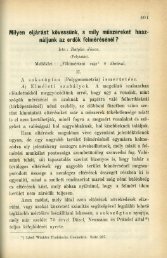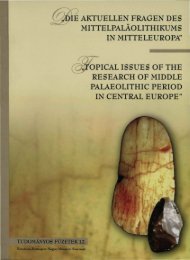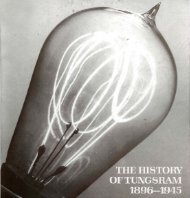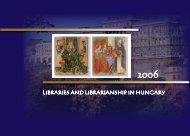- Page 1 and 2:
NATIONAL POPULISMAND SLOVAK - HUNGA
- Page 3 and 4:
National Populism and Slovak - Hung
- Page 5 and 6:
NatioNal PoPulismaNd slovak - HuNga
- Page 7 and 8:
ContentIntroduction................
- Page 9 and 10:
ContentZsolt Gál: Argentina on the
- Page 11 and 12:
iNtroductioNPolitical development i
- Page 13 and 14:
Introductionweapons, such as exposi
- Page 15 and 16:
Peter uèeò:Approaching National P
- Page 17 and 18:
Approaching National Populismpopula
- Page 19 and 20:
Approaching National Populismdirect
- Page 21 and 22:
Approaching National Populismnation
- Page 23 and 24:
Approaching National Populismmakes
- Page 25 and 26:
Approaching National PopulismThe fo
- Page 27 and 28:
Approaching National Populismas Slo
- Page 29 and 30:
Approaching National Populismenemie
- Page 31:
Approaching National PopulismWhat o
- Page 34 and 35:
Peter UèeòNational Populism and S
- Page 36 and 37:
Peter UèeòNational Populism and S
- Page 38 and 39:
Peter UèeòNational Populism and S
- Page 40 and 41:
Peter UèeòNational Populism and S
- Page 42 and 43:
Grigorij MesežnikovNational Populi
- Page 44 and 45:
Grigorij MesežnikovNational Populi
- Page 46 and 47:
Grigorij MesežnikovNational Populi
- Page 48 and 49:
Grigorij MesežnikovNational Populi
- Page 50 and 51:
Grigorij MesežnikovNational Populi
- Page 52 and 53:
Grigorij MesežnikovNational Populi
- Page 54 and 55:
Grigorij MesežnikovNational Populi
- Page 56 and 57:
Grigorij MesežnikovNational Populi
- Page 58 and 59:
Grigorij MesežnikovNational Populi
- Page 60 and 61:
Grigorij MesežnikovNational Populi
- Page 62 and 63:
Grigorij MesežnikovNational Populi
- Page 64 and 65:
Grigorij MesežnikovNational Populi
- Page 66 and 67:
Grigorij MesežnikovNational Populi
- Page 68 and 69:
Grigorij MesežnikovNational Populi
- Page 70 and 71:
Kálmán PetõczNational Populism a
- Page 72 and 73:
Kálmán PetõczNational Populism a
- Page 74 and 75:
Kálmán PetõczNational Populism a
- Page 76 and 77:
Kálmán PetõczNational Populism a
- Page 78 and 79:
Kálmán PetõczNational Populism a
- Page 80 and 81:
Kálmán PetõczNational Populism a
- Page 82 and 83:
Kálmán PetõczNational Populism a
- Page 84 and 85:
Kálmán PetõczNational Populism a
- Page 86 and 87:
Kálmán PetõczNational Populism a
- Page 88 and 89:
Kálmán PetõczNational Populism a
- Page 90 and 91:
Kálmán PetõczNational Populism a
- Page 92 and 93:
Kálmán PetõczNational Populism a
- Page 94 and 95:
Kálmán PetõczNational Populism a
- Page 96 and 97:
Kálmán PetõczNational Populism a
- Page 98 and 99:
Kálmán PetõczNational Populism a
- Page 100 and 101:
Kálmán PetõczNational Populism a
- Page 102 and 103:
Kálmán PetõczNational Populism a
- Page 104 and 105:
Kálmán PetõczNational Populism a
- Page 106 and 107:
Kálmán PetõczNational Populism a
- Page 108 and 109:
Kálmán PetõczNational Populism a
- Page 110 and 111:
Kálmán PetõczNational Populism a
- Page 112 and 113:
Kálmán PetõczNational Populism a
- Page 114 and 115:
Kálmán PetõczNational Populism a
- Page 116 and 117:
Kálmán PetõczNational Populism a
- Page 118 and 119:
Kálmán PetõczNational Populism a
- Page 120 and 121:
Kálmán PetõczNational Populism a
- Page 122 and 123:
Kálmán PetõczNational Populism a
- Page 124 and 125:
Kálmán PetõczNational Populism a
- Page 126 and 127:
Kálmán PetõczNational Populism a
- Page 128 and 129:
Kálmán PetõczNational Populism a
- Page 130 and 131:
Kálmán PetõczNational Populism a
- Page 132 and 133:
Kálmán PetõczNational Populism a
- Page 134 and 135:
Kálmán PetõczNational Populism a
- Page 136 and 137:
Kálmán PetõczNational Populism a
- Page 138 and 139:
Kálmán PetõczNational Populism a
- Page 140 and 141:
Kálmán PetõczNational Populism a
- Page 142 and 143:
Kálmán PetõczNational Populism a
- Page 144 and 145:
Kálmán PetõczNational Populism a
- Page 146 and 147:
Kálmán PetõczNational Populism a
- Page 148 and 149:
Kálmán PetõczNational Populism a
- Page 150 and 151:
Kálmán PetõczNational Populism a
- Page 152 and 153:
Kálmán PetõczNational Populism a
- Page 154 and 155:
Kálmán PetõczNational Populism a
- Page 156 and 157:
Kálmán PetõczNational Populism a
- Page 158 and 159:
Kálmán PetõczNational Populism a
- Page 160 and 161:
Kálmán PetõczNational Populism a
- Page 162 and 163:
Kálmán PetõczNational Populism a
- Page 164 and 165:
Kálmán PetõczNational Populism a
- Page 166 and 167:
Kálmán PetõczNational Populism a
- Page 168 and 169:
National Populism and Slovak - Hung
- Page 170 and 171:
Zuzana Mészárosová-LamplováNati
- Page 172 and 173:
Zuzana Mészárosová-LamplováNati
- Page 174 and 175:
Zuzana Mészárosová-LamplováNati
- Page 176 and 177:
Zuzana Mészárosová-LamplováNati
- Page 178 and 179:
Zuzana Mészárosová-LamplováNati
- Page 180 and 181:
Zuzana Mészárosová-LamplováNati
- Page 182 and 183:
National Populism and Slovak - Hung
- Page 184 and 185:
Zsolt GálNational Populism and Slo
- Page 186 and 187:
Zsolt GálNational Populism and Slo
- Page 188 and 189:
Zsolt GálNational Populism and Slo
- Page 190 and 191:
Zsolt GálNational Populism and Slo
- Page 192 and 193:
Zsolt GálNational Populism and Slo
- Page 194 and 195:
Zsolt GálNational Populism and Slo
- Page 196 and 197:
Zsolt GálNational Populism and Slo
- Page 198 and 199:
Zsolt GálNational Populism and Slo
- Page 200 and 201:
Zsolt GálNational Populism and Slo
- Page 202 and 203:
Zsolt GálNational Populism and Slo
- Page 204 and 205:
Zsolt GálNational Populism and Slo
- Page 206 and 207: Zsolt GálNational Populism and Slo
- Page 208 and 209: Zsolt GálNational Populism and Slo
- Page 210 and 211: Zsolt GálNational Populism and Slo
- Page 212 and 213: Zsolt GálNational Populism and Slo
- Page 214 and 215: Zsolt GálNational Populism and Slo
- Page 216 and 217: Zsolt GálNational Populism and Slo
- Page 218 and 219: Zsolt GálNational Populism and Slo
- Page 220 and 221: Zsolt GálNational Populism and Slo
- Page 222 and 223: Zsolt GálNational Populism and Slo
- Page 224 and 225: Miroslav KocúrNational Populism an
- Page 226 and 227: Miroslav KocúrNational Populism an
- Page 228 and 229: Miroslav KocúrNational Populism an
- Page 230 and 231: Miroslav KocúrNational Populism an
- Page 232 and 233: Miroslav KocúrNational Populism an
- Page 234 and 235: Miroslav KocúrNational Populism an
- Page 236 and 237: Miroslav KocúrNational Populism an
- Page 238 and 239: Miroslav KocúrNational Populism an
- Page 240 and 241: Miroslav KocúrNational Populism an
- Page 242 and 243: Miroslav KocúrNational Populism an
- Page 244 and 245: Miroslav KocúrNational Populism an
- Page 246 and 247: Miroslav KocúrNational Populism an
- Page 248 and 249: National Populism and Slovak - Hung
- Page 250 and 251: László ÖllösNational Populism a
- Page 252 and 253: László ÖllösNational Populism a
- Page 254 and 255: László ÖllösNational Populism a
- Page 258 and 259: László ÖllösNational Populism a
- Page 260 and 261: László ÖllösNational Populism a
- Page 262 and 263: László ÖllösNational Populism a
- Page 264 and 265: László ÖllösNational Populism a
- Page 266 and 267: László ÖllösNational Populism a
- Page 268 and 269: László ÖllösNational Populism a
- Page 270 and 271: National Populism and Slovak - Hung
- Page 272 and 273: Annex - Kálmán PetõczNational Po
- Page 274 and 275: Annex - Kálmán PetõczNational Po
- Page 276 and 277: Annex - Kálmán PetõczNational Po
- Page 278 and 279: Annex - Kálmán PetõczNational Po
- Page 280 and 281: Annex - Kálmán PetõczNational Po
- Page 282 and 283: Annex - Kálmán PetõczNational Po
- Page 284 and 285: Annex - Kálmán PetõczNational Po
- Page 286 and 287: Annex - Kálmán PetõczNational Po
- Page 288 and 289: Annex - Kálmán PetõczNational Po
- Page 290 and 291: Annex - Kálmán PetõczNational Po
- Page 292 and 293: Annex - Kálmán PetõczNational Po
- Page 294 and 295: Annex - Kálmán PetõczNational Po
- Page 296 and 297: Annex - Kálmán PetõczNational Po
- Page 298 and 299: Annex - Kálmán PetõczNational Po
- Page 300 and 301: National Populism and Slovak - Hung
- Page 302 and 303: Annex - Marie VrabcováNational Pop
- Page 304 and 305: Annex - Marie VrabcováNational Pop
- Page 306 and 307:
Annex - Marie VrabcováNational Pop
- Page 308 and 309:
Annex - Marie VrabcováNational Pop
- Page 310 and 311:
Annex - Marie VrabcováNational Pop
- Page 312 and 313:
Annex - Marie VrabcováNational Pop
- Page 314 and 315:
Annex - Marie VrabcováNational Pop
- Page 316 and 317:
Annex - Marie VrabcováNational Pop
- Page 318 and 319:
Annex - Marie VrabcováNational Pop
- Page 320 and 321:
Annex - Marie VrabcováNational Pop
- Page 322 and 323:
Annex - Marie VrabcováNational Pop
- Page 324 and 325:
Annex - Marie VrabcováNational Pop
- Page 326 and 327:
Annex - Marie VrabcováNational Pop
- Page 328 and 329:
Annex - Marie VrabcováNational Pop
- Page 330 and 331:
Annex - Marie VrabcováNational Pop
- Page 332 and 333:
Annex - Marie VrabcováNational Pop
- Page 334 and 335:
Annex - Marie VrabcováNational Pop
- Page 336 and 337:
Annex - Marie VrabcováNational Pop
- Page 338 and 339:
Annex - Marie VrabcováNational Pop
- Page 340 and 341:
National Populism and Slovak - Hung
- Page 342 and 343:
BibliographyNational Populism and S
- Page 344 and 345:
BibliographyNational Populism and S
- Page 346 and 347:
BibliographyNational Populism and S
- Page 348 and 349:
BibliographyNational Populism and S
- Page 350 and 351:
BibliographyNational Populism and S
- Page 352 and 353:
BibliographyNational Populism and S
- Page 354 and 355:
BibliographyNational Populism and S
- Page 356 and 357:
List of abbreviationsNational Popul
- Page 358 and 359:
AuthorsNational Populism and Slovak
- Page 360 and 361:
AuthorsNational Populism and Slovak
- Page 362 and 363:
National Populism and Slovak - Hung
- Page 364:
Political development in Central Eu


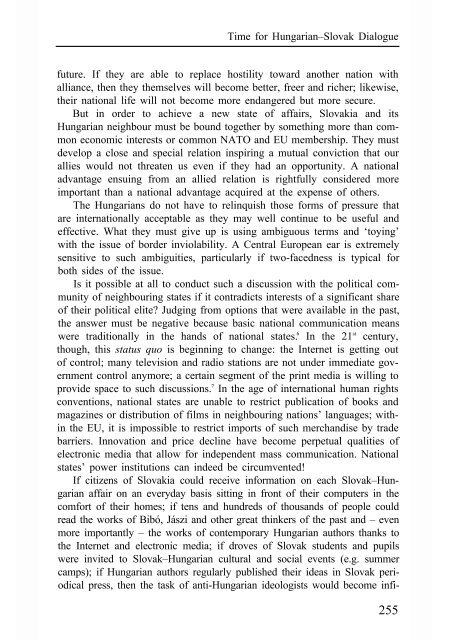
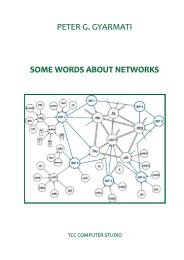

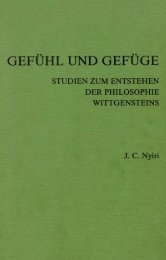
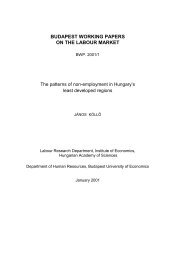

![Letöltés egy fájlban [4.3 MB - PDF]](https://img.yumpu.com/50159926/1/180x260/letaltacs-egy-fajlban-43-mb-pdf.jpg?quality=85)

